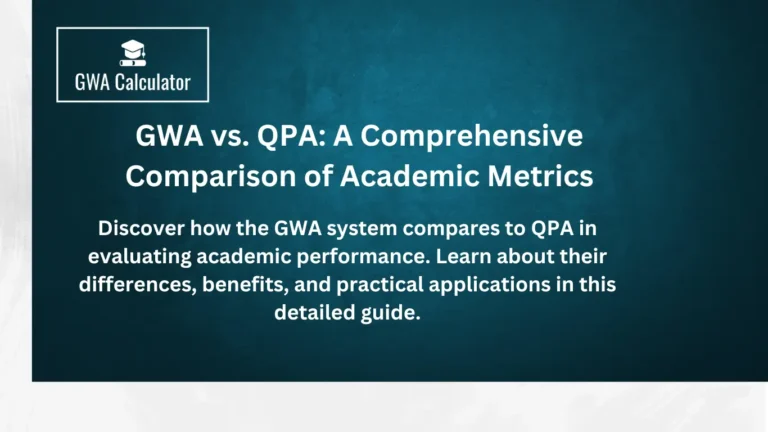The College Grading System in the Philippines: A Comprehensive Guide
Understanding the college grading system in the Philippines is essential for students aiming for academic success, as well as for parents, teachers, and academic advisors who help guide them.
The system can vary between universities and colleges, but it generally follows a similar structure, making it important to understand the grading scales, equivalent grades, and how they impact a student’s academic journey.
What is the College Grading System in the Philippines?
In the Philippines, the college grading system is designed to measure a student’s academic performance based on a standard set of criteria. Most universities use a numerical grading system, but these numbers have equivalent letter grades or descriptions to indicate performance levels.
Commonly, the grades range from 1.00 to 5.00, with 1.00 being the highest (equivalent to excellent performance) and 5.00 representing failure. However, different institutions may have slight variations in their grading scale.
| Grade | Description | Equivalent |
|---|---|---|
| 1.00 | Excellent | 95-100 |
| 1.25 | Very Good | 90-94 |
| 1.50 | Very Good | 85-89 |
| 1.75 | Good | 80-84 |
| 2.00 | Good | 75-79 |
| 2.25 | Satisfactory | 70-74 |
| 2.50 | Satisfactory | 65-69 |
| 2.75 | Passing | 60-64 |
| 3.00 | Passing | 55-59 |
| 4.00 | Conditional (May Pass) | 50-54 |
| 5.00 | Fail | Below 50 |
College Grade Equivalent: What Do These Grades Mean?
In the Philippines, the college grade equivalent provides a direct comparison between numerical grades and their corresponding descriptions. These grades are critical for evaluating academic performance. For example, a 1.00 signifies that a student has performed exceptionally well, while a 5.00 indicates failure. Understanding the grade equivalent helps students assess where they stand and what they need to improve.
College Grading Scale: How Does It Work?
The college grading scale can vary between institutions, but most follow the same structure where grades reflect academic performance in a range of subjects. Many universities use this numerical scale alongside letter grades, offering students a clear idea of their standing.
- Excellent (1.00): Top students who score between 95-100% typically receive a 1.00, representing the highest academic achievement.
- Passing (3.00): Students who score between 55-59% pass the course, but their performance may require improvement.
- Conditional (4.00): Some schools issue a 4.00 for students who need to retake a course or submit further requirements to pass.
- Fail (5.00): A score below 50% results in failure, requiring the student to retake the course.
How Does the Grading System Impact Students?
The college grading system plays a significant role in determining a student’s future opportunities, including their eligibility for scholarships, honors, and even employment. Universities often set high standards for awarding cum laude, magna cum laude, and summa cum laude honors, which usually require a GWA (General Weighted Average) close to 1.00.
For instance:
- Cum laude: Typically requires a GWA of 1.75 or higher.
- Magna cum laude: Requires a GWA of 1.50 or higher.
- Summa cum laude: Requires a GWA of 1.25 or higher.
Academic performance as reflected in the college grading system can also influence whether a student is eligible for competitive internships, leadership programs, and graduate schools.
How to Excel in the College Grading System in the Philippines
Here are some tips for students looking to succeed within the college grading system:
- Set Clear Academic Goals: Aim for high grades early on, especially if you plan to apply for honors or scholarships. Knowing how the college grading scale works can help you maintain focus.
- Master Time Management: Staying on top of deadlines and assignments is crucial. Students who organize their time well often achieve better results, maintaining higher grade equivalents.
- Seek Help When Needed: If you’re struggling with a subject, seek help from teachers, tutors, or academic advisors. Staying proactive can prevent grades from slipping.
- Participate in Class: Engaging in discussions and activities can boost your overall performance, contributing to higher grades.
- Stay Consistent: It’s not enough to do well on one test or assignment. Consistent performance across all subjects is key to maintaining a high GWA.
Common Questions About the College Grading System in the Philippines
- How does GWA differ from GPA?
- GWA (General Weighted Average) is the term commonly used in the Philippines, while GPA (Grade Point Average) is used in other countries like the U.S. They both measure academic performance, but the calculation methods may differ slightly.
- How do I compute my GWA?
- You can compute your GWA by multiplying the grade for each subject by the number of units or credits, summing the results, and dividing the total by the sum of all units or credits taken.
- What grade is needed to pass college in the Philippines?
- A grade of 3.00 or higher is generally needed to pass. Some institutions may offer conditional passing grades, like 4.00, which require additional coursework to convert to a passing grade.
- What is a good GWA for scholarships?
- A GWA of 1.50 or better is often required for competitive scholarships, while some may accept a GWA up to 2.00.
- How do colleges determine honors and distinctions?
- Colleges use the GWA as a basis for awarding honors like cum laude, magna cum laude, and summa cum laude. A GWA close to 1.00 is generally needed for top distinctions.
Conclusion: Mastering the College Grading System
The college grading system in the Philippines is more than just numbers—it’s a reflection of a student’s dedication and hard work. Whether you’re a student aiming for honors or simply looking to pass your courses, understanding the grade equivalent and college grading scale will help you set realistic academic goals. Stay consistent, seek help when necessary, and take advantage of the many resources available to you.







